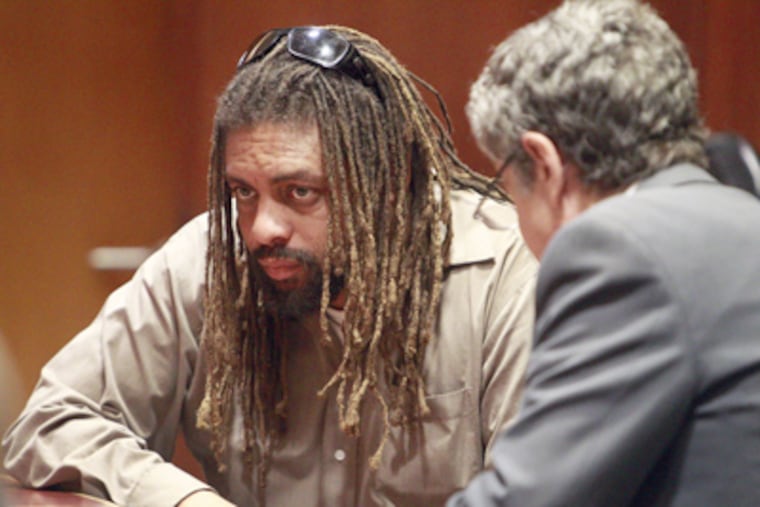Jury pondering intent of Weedman’s pot possession
Outside the Burlington County courthouse in Mount Holly, a protester was shaking hands with a string of passersby who had stopped to read his sign: “Medical Marijuana. What Do You Say to Unjust Law?” Inside, Ed Forchion, better known NJ Weedman, was venturing into uncharted territory, trying to persuade a Superior Court jury to acquit him of drug charges because he holds a medical marijuana patient card in California. He says he needs the drug to alleviate pain associated with giant cell cancer in his bones.

Outside the Burlington County courthouse in Mount Holly, a protester was shaking hands with a string of passersby who had stopped to read his sign: "Medical Marijuana. What Do You Say to Unjust Law?"
Inside, Ed Forchion, better known NJ Weedman, was venturing into uncharted territory, trying to persuade a Superior Court jury to acquit him of drug charges because he holds a medical marijuana patient card in California. He says he needs the drug to alleviate pain associated with giant cell cancer in his bones.
The jury, which deliberated for more than an hour Tuesday afternoon, is scheduled to resume discussions Wednesday.
This drug case has become a forum on marijuana in a country divided over its medicinal uses and a state that has not quite come to terms with its 2010 law, which allows the drug to be prescribed for certain illnesses. The implementation of the New Jersey law has been delayed several times, and no resident has received the drug.
Sixteen states, but not Pennsylvania, now have medical marijuana laws, though the federal government still views the drug as illegal. Federal officials have said they will not prosecute when those states' laws are obeyed.
After much debate, Judge Charles Delehey ruled that Forchion, a Rastafarian and marijuana activist, could argue at trial that he possessed a pound of marijuana strictly for his medical treatment and that he has a California-issued card.
Forchion, 47, formerly of Pemberton, is charged with possessing marijuana and planning to distribute it. A conviction on both charges could lead to 10 years in prison. He has admitted that the drug was in his trunk when he was stopped in Mount Holly two years ago for a traffic violation.
In another high-profile marijuana case, John Ray Wilson, a Somerset County man, was not permitted to argue at his 2009 trial that he grew marijuana plants to treat multiple sclerosis. The judge in his case said his medical condition was irrelevant. Wilson was convicted and recently sentenced to five years in prison after losing his appeal.
Delehey did, however, place some restrictions on Forchion, who represented himself at trial. Delehey forbade him from mentioning New Jersey's medical marijuana law.
Under that law, low-potency marijuana is restricted to patients with cancer, multiple sclerosis, Crohn's disease, and several other serious illnesses after they have been diagnosed by a registered state doctor. The law does not recognize patient cards issued in other states.
Steven Fenichel, a Cape May County family physician/dermatologist, testified that he discovered Forchion's "giant cell" cancer tumors in his right leg in 2001 and 2002. He said X-rays confirmed the diagnosis, and he referred Forchion to a surgeon, who removed them. Since then, he said, the tumors have recurred in Forchion's leg and shoulders.
"It causes deep-seated pain of the bone and a lot of discomfort," Fenichel testified.
On cross-examination, Assistant Prosecutor Michael Luciano questioned why a patient with these symptoms would go to a doctor who mostly practiced as a dermatologist at that time. "It depends ... if someone has no health insurance," he replied before Luciano cut the rest of his answer off.
In closing arguments, Luciano said that Forchion broke the law when he decided to possess marijuana in New Jersey, where he is not permitted to use it. "He knowingly and purposely chose to break the law," Luciano said. "His pain can be treated in myriad ways" in New Jersey.
Luciano also argued that the brick of marijuana confiscated by a state trooper was not intended for one person's use.
"Look how big that is," he told jurors, saying they would get to examine it in the jury room. He also noted that Forchion was carrying $2,000 in cash when he was arrested April 1, 2010.
Forchion, who ran a well-known medical-marijuana dispensary in Hollywood for several years until it was raided by federal authorities last year. decided not to take the stand. In his closing arguments, he told the jury that he had traveled from California to visit his family in New Jersey and was carrying a suitcase full of clothes and "his medicine" when he was stopped.
"I choose to use marijuana as opposed to other drugs that are out there," he said. "There's a huge discussion throughout the country about the issue of marijuana."
Forchion said that he smoked marijuana almost every day to alleviate the pain from his tumors and that the amount he carried would get him through a month or two while he was in New Jersey.
He also told the jury that it has "the right to determine the law and the facts. ... I hope that's what you do, determine the law."
The judge interrupted him and warned jurors that they are "obligated under your oath to apply the law as this court gives it to you." Before the trial began, Delehey had instructed Forchion against putting the law on trial, as Forchion said he had planned. Delehey said the jury's role was to judge only the facts.
Contact Jan Hefler at 856-779-3224, jhefler@phillynews.com or follow her on Twitter @JanHefler. Read her blog on philly.com/BurlcoBuzz